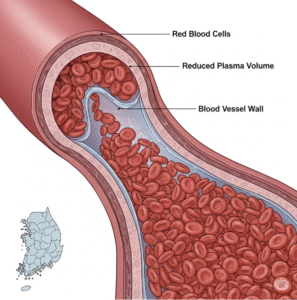Overview
Cytomegalovirus (CMV) infection is caused by the CMV virus, a member of the herpesvirus family. It is common worldwide and often remains asymptomatic in healthy individuals, but can cause serious illness in newborns, pregnant women, and immunocompromised patients. South Korea provides advanced diagnostic, antiviral treatment, and preventive care for CMV infections.
What is Cytomegalovirus Infection?
CMV infection occurs when the virus enters the body through saliva, blood, urine, sexual contact, or organ transplantation. While most healthy adults experience mild or no symptoms, CMV can lead to congenital infection in babies or severe disease in individuals with weakened immune systems, such as HIV patients or transplant recipients.
Symptoms
In Healthy Adults:
- Mild fever
- Fatigue
- Sore throat
- Swollen lymph nodes
- Muscle aches
In Congenital CMV Infection (Newborns):
- Low birth weight
- Jaundice
- Enlarged liver or spleen
- Microcephaly (small head)
- Hearing loss or vision problems
In Immunocompromised Patients:
- Pneumonia
- Gastrointestinal inflammation (colitis, hepatitis)
- Retinitis causing vision loss
- Encephalitis or neurological symptoms
Causes
- Infection with Cytomegalovirus (CMV)
- Transmission through bodily fluids (saliva, blood, urine, semen)
- Organ transplantation or blood transfusions from infected donors
- Vertical transmission from mother to fetus
Risk Factors
- Pregnancy (especially primary CMV infection in the first trimester)
- Immunocompromised individuals (HIV, chemotherapy, organ transplant)
- Close contact with young children
- Healthcare or daycare workers exposed to bodily fluids
Complications
- Congenital CMV: Hearing loss, vision impairment, developmental delays
- Immunocompromised patients: Severe organ involvement (lungs, liver, GI tract, CNS)
- Retinitis: Can lead to blindness if untreated
- Chronic fatigue in some adults
Prevention
- Frequent handwashing, especially after contact with bodily fluids
- Avoid sharing utensils or drinks with young children
- Blood and organ donor screening
- Safe sexual practices
- Prenatal CMV screening in high-risk pregnancies
Treatment Options in Korea
South Korea offers specialized infectious disease care with access to antiviral therapies and monitoring:
1. Diagnosis
- Blood tests for CMV IgM and IgG antibodies
- PCR testing to detect viral DNA
- Urine or saliva viral cultures
- Imaging or eye exams for organ-specific complications
2. Medication
- Ganciclovir (IV) for severe or congenital infections
- Valganciclovir (oral) for milder cases or maintenance therapy
- Supportive care for symptom management
3. Monitoring
- Regular blood and organ function tests
- Hearing and vision assessment for newborns
- Viral load monitoring in transplant patients
4. Preventive Care
- Antiviral prophylaxis in high-risk transplant recipients
- Prenatal counseling and monitoring for pregnant women
- Education on hygiene and exposure prevention













